 W
WThe genealogies of Genesis provide the framework around which the Book of Genesis is structured. Beginning with Adam, genealogical material in Genesis 4, 5, 10, 11, 22, 25, 29-30, 35-36, and 46 move the narrative forward from the creation to the beginnings of Israel's existence as a people.
 W
WThe Generations of Noah or Table of Nations, broadly referred to as Origines Gentium, is a genealogy of the sons of Noah, according to the Hebrew Bible, and their dispersion into many lands after the Flood, focusing on the major known societies. The term nations to describe the descendants is a standard English translation of the Hebrew word "goy", following the c. 400 CE Latin Vulgate's "nationes", and does not have the same political connotations that the word entails today.
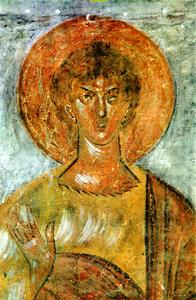 W
WAbel is a Biblical figure in the Book of Genesis within Abrahamic religions. He is the younger brother of Cain, and the younger son of Adam and Eve, the first couple within the Biblical tale. He was a shepherd who offered his firstborn flock up to God as an offering. God accepted his offering but not his brother’s. Out of jealousy Cain killed Abel.
 W
WAbraham is the common patriarch of the Abrahamic religions, including Judaism, Christianity, and Islam. In Judaism, he is the founding father of the covenant of the pieces, the special relationship between the Hebrews and God; in Christianity, he is the spiritual progenitor of all believers, Jewish or Gentile; and in Islam he is seen as a link in the chain of prophets that begins with Adam and culminates in Muhammad.
 W
WAdam is a figure in the Book of Genesis in the Hebrew Bible, and in the Quran and Christian belief. According to the creation myth of the Abrahamic religions, he was the first man. In both Genesis and Quran, Adam and his wife were expelled from the Garden of Eden for eating the fruit of the tree of knowledge of good and evil.
 W
WAdam and Eve, according to the creation myth of the Abrahamic religions, were the first man and woman. They are central to the belief that humanity is in essence a single family, with everyone descended from a single pair of original ancestors. They also provide the basis for the doctrines of the fall of man and original sin that are important beliefs in Christianity, although not held in Judaism or Islam.
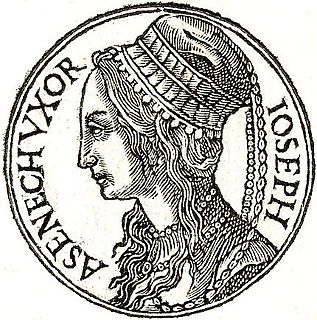 W
WAsenath is a minor figure in the Book of Genesis. Asenath was a high-born, aristocratic Egyptian woman. She is one of two wives of Joseph. There are two Rabbinic approaches to Asenath. One view is that she is an ethnic Egyptian woman that converted to marry Joseph. This view has her accepting the Lord before marriage and then raises her two sons in the tenets of Judaism. This tradition presents her as a positive example of conversion, and places her among the devout women converts.The other approach argues she is not Egyptian by descent, but was from the family of Jacob. The traditions that trace her to the family of Jacob relate that she was born the daughter of Dinah after being raped by Shechem. Dinah left her on the wall of Egypt where she was later found by Potiphera. She was raised by Potiphera and his wife, who was barren, as their own child. Her importance is related to the birth of her two sons, who later become forefathers of two of the twelve tribes of Israel.
 W
WAsher, in the Book of Genesis, is the second son of Jacob and Zilpah, and the founder of the Tribe of Asher.
 W
WCain is a Biblical figure in the Book of Genesis within Abrahamic religions. He is the older brother of Abel, and the older son of Adam and Eve, the first couple within the Biblical tale. He was a farmer who gave an offering of his crops to God with which God was not pleased and favored Abel's over Cain. Out of jealousy he then killed his brother, which lead to the punishment as the curse and mark of Cain. He had various offsprings starting with Enoch including Lamech. His lineage would later be wiped out after the Flood within the narrative.
 W
WIn the biblical Book of Genesis, Cain and Abel are the first two sons of Adam and Eve. Cain, the firstborn, was a farmer, and his brother Abel was a shepherd. The brothers made sacrifices to God, each of his own produce, but God favored Abel's sacrifice instead of Cain's. Cain then murdered Abel, whereupon Yahweh punished Cain by condemning him to a life of wandering. Cain then dwelt in the land of Nod, where he built a city and fathered the line of descendants beginning with Enoch.
 W
WAccording to the Book of Genesis, Dan was the fifth son of Jacob and the first son of Bilhah. He was the founder of the Israelite Tribe of Dan. In the biblical account, Dan's mother is described as Rachel's handmaid, who becomes one of Jacob's wives.
 W
WIn the Book of Genesis, Dinah was the daughter of Jacob, one of the patriarchs of the Israelites, and Leah, his first wife. The episode of her violation by Shechem, son of a Canaanite or Hivite prince, and the subsequent vengeance of her brothers Simeon and Levi, commonly referred to as the rape of Dinah, is told in Genesis 34.
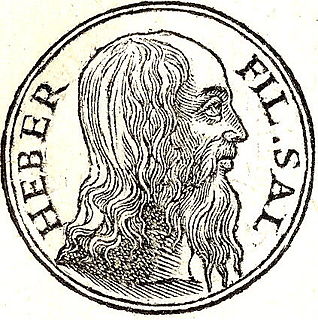 W
WEber is an ancestor of the Israelites and the Ishmaelites according to the "Table of Nations" in the Book of Genesis and the Books of Chronicles.
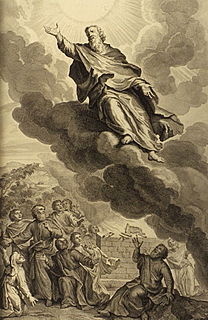 W
WEnoch is a biblical figure prior to Noah's flood and the son of Jared and father of Methuselah. He was of the Antediluvian period in the Hebrew Bible. This Enoch is not to be confused with Cain's son Enoch.
 W
WEnoch is a character in the Book of Genesis. He is described as a son of Cain, and father of Irad. After Cain arrived in the Land of Nod, to which he was evicted by the Lord as his punishment for murdering his brother Abel, his wife became pregnant and bore Cain's first child, whom he named Enoch.
 W
WEnos or Enosh is a character in the Book of Genesis in the Hebrew Bible. He is described as the first son of Seth who figures in the Generations of Adam, and is also referred to within the genealogies of 1 Chronicles.
 W
WEsau in the Hebrew Bible, is the older son of Isaac. He is mentioned in the Book of Genesis, and by the prophets Obadiah and Malachi. The New Testament alludes to him in the Epistle to the Romans and in the Epistle to the Hebrews.
 W
WEve is a figure in the Book of Genesis in the Hebrew Bible as well as a figure in the Quran. According to the origin story of the Abrahamic religions, she was the first woman. Eve is known also as Adam's wife.
 W
WHagar is a biblical person in the Book of Genesis. She was an Ancient Egyptian servant of Sarah, who gave her to Abraham to bear a child. The product of the union was Abraham's firstborn, Ishmael, the progenitor of the Ishmaelites, generally taken to be the Arabians. Various commentators have connected her to the Hagrites, perhaps claiming her as their eponymous ancestor.
 W
WHam, according to the Table of Nations in the Book of Genesis, was the second son of Noah and the father of Cush, Mizraim, Phut and Canaan.
 W
WIshmael, a figure in the Tanakh and the Quran, was Abraham's first son according to Jews, Christians and Muslims. Ishmael was born to Abraham and Sarah's Egyptian handmaiden Hagar (Hājar). According to the Genesis account, he died at the age of 137.
 W
WJabal or Yabal is an individual mentioned in the Hebrew Bible, in Genesis 4:20.
 W
WJoseph is an important figure in the Bible's Book of Genesis.
 W
WJubal is a man mentioned in the Hebrew Bible, in Genesis 4:21.
 W
WJudah was, according to the Book of Genesis, the fourth son of Jacob and Leah, the founder of the Israelite Tribe of Judah. By extension, he is indirectly eponymous of the Kingdom of Judah, the land of Judea and the word Jew.
 W
WKeturah was a concubine and wife of the Biblical patriarch Abraham. According to the Book of Genesis, Abraham married Keturah after the death of his first wife, Sarah. Abraham and Keturah had six sons.
 W
WLaban, also known as Laban the Aramean, is a figure in the Book of Genesis of the Hebrew Bible. He was the brother of Rebekah, who married Isaac and bore Jacob. Laban welcomed his nephew as a young man, and set him the stipulation of seven years' labour before he permitted him to marry his daughter Rachel. Laban tricked Jacob into marrying his elder daughter Leah instead. Jacob then took Rachel as his second wife, on condition of serving an additional seven years' labour.
 W
WLamech is a person in Cain's genealogy in the fourth chapter of the Book of Genesis. He is a sixth-generation descendant of Cain ; his father was named Methushael, and he was responsible for the "Song of the Sword". He is also noted as the first polygamist mentioned in the Bible, taking two wives, Adah and Zillah (Tselah).
 W
WLeah is an important, albeit minor, character in Judeo-Christian literature, the unloved wife of the Biblical patriarch Jacob. Leah was Jacob's first wife, and the older sister of his second wife Rachel. She is the mother of Jacob's first son Reuben. She has three more sons, namely Simeon, Levi and Judah, but does not bear another son until Rachel offers her a night with Jacob in exchange for some mandrake root דודאים (dûdâ'îm). Leah gives birth to two more sons after this, Issachar and Zebulun, and a daughter called Dinah.
 W
WLevi was, according to the Book of Genesis, the third son of Jacob and Leah, and the founder of the Israelite Tribe of Levi and the grandfather of Aaron and Moses. Certain religious and political functions were reserved for the Levites.
 W
WLot was a patriarch in the biblical Book of Genesis, chapters 11–14 and 19. Notable events in his life include his journey with his uncle Abram (Abraham) and his flight from the destruction of Sodom and Gomorrah, during which Lot's wife became a pillar of salt, and Lot was made drunk by his daughters so that they could have children with him.
 W
WLot's daughters are four women, two unnamed people in the Book of Genesis, and two others, including Paltith, in the Book of Jasher.
 W
WIn the Bible, Lot's wife is a figure first mentioned in Genesis 19. The Book of Genesis describes how she became a pillar of salt after she looked back at Sodom. She is not named in the Bible but is called "Ado" or "Edith" in some Jewish traditions. She is also referred to in the deuterocanonical books at Wisdom 10:7 and the New Testament at Luke 17:32. Islamic accounts also talk about the wife of Prophet Lut (Lot) when mentioning 'People of Lut'.
 W
WLud was a son of Shem and grandson of Noah, according to Genesis 10.
 W
WMelchizedek, Melchisedech, Melkisetek, or Malki Tzedek, was the king of Salem and priest of El Elyon mentioned in the 14th chapter of the Book of Genesis. He brings out bread and wine and then blesses Abram and El Elyon.
 W
WMethuselah was a biblical patriarch and a figure in Judaism, Christianity, and Islam. Said to have died at the age of 969, he lived the longest of all figures mentioned in the Bible. According to the Book of Genesis, Methuselah was the son of Enoch, the father of Lamech, and the grandfather of Noah. Elsewhere in the Bible, Methuselah is mentioned in genealogies in 1st Chronicles and the Gospel of Luke.
 W
WNaamah is an individual mentioned in the Hebrew Bible, in Genesis 4:22. A descendant of Cain, she was the only mentioned daughter of Lamech and Zillah and their youngest mentioned child; her brother was Tubal-cain, while Jabal and Jubal were her half-brothers, sons of Lamech's other wife Adah.
 W
WNahor is the son of Serug according to the Hebrew Bible. In Genesis Chapter 11, Nahor is listed as the son of Serug. He is said to have lived to the age of 148 years old and had a son, Terah at the age of 29. He was also the grandfather of Abraham, Nahor II and Haran, all descendants of Shem.
 W
WThe Nephilim are mysterious beings or people mentioned in the Hebrew Bible. They are large and strong; the word Nephilim is loosely translated as giants in some Bibles but left untranslated in others. Some traditional Jewish explanations interpret them as fallen angels. The main reference to them is in Genesis, but the passage is ambiguous and the identity of the Nephilim is disputed.
 W
WNimrod, a biblical figure described as a king in the land of Shinar (Mesopotamia), was, according to the Book of Genesis and Books of Chronicles, the son of Cush. The Bible states that he was "a mighty hunter before the Lord [and] ... began to be mighty in the earth". Extra-biblical traditions associating him with the Tower of Babel led to his reputation as a king who was rebellious against God.
 W
WIn the traditions of Abrahamic religions, Noah features as the tenth and last of the pre-Flood patriarchs. His story appears in the Hebrew Bible and in the Quran. The Genesis flood narrative is among the best-known stories of the Bible. Noah is also portrayed as a "tiller of the soil" and as a drinker of wine.
 W
WPerez, also written as Pharez/Perets, was the son of Tamar and Judah, and the twin of Zerah, according to the Book of Genesis. The name is transliterated to English as both "Perez" and "Pharez" (KJV). Perez, in Hebrew means "breach or burst forth" and is named after the narrative of his birth as recorded in Genesis 38:29.
 W
WPotiphar, also known as Aziz in Islam, is a figure in the Hebrew Bible and the Quran. He is the captain of Pharaoh's guard who is said to have purchased Joseph as a slave and, impressed by his intelligence, makes him the master of his household. Unfortunately, Potiphar's wife, who was known for her infidelities, took a liking to Joseph, and attempted to seduce him. When Joseph refused her advances, and ran off, she retaliated by falsely accusing him of trying to rape her, and Potiphar had Joseph imprisoned. According to G.J. Wenham, execution was normal in rape cases, and so the story implies that Potiphar had doubts about his wife's account.
 W
WRachel was a Biblical figure, the favorite of Jacob's two wives, and the mother of Joseph and Benjamin, two of the twelve progenitors of the tribes of Israel. Rachel's father was Laban. Her older sister was Leah, Jacob's first wife; their mother was Adinah. Her aunt Rebekah was Jacob's mother.
 W
WRebecca appears in the Hebrew Bible as the wife of Isaac and the mother of Jacob and Esau. According to biblical tradition, Rebecca's father was Bethuel the Aramean from Paddan Aram, also called Aram-Naharaim. Rebecca's brother was Laban the Aramean, and she was the granddaughter of Milcah and Nahor, the brother of Abraham. Rebecca and Isaac were one of the four couples that some believe are buried in the Cave of the Patriarchs, the other three being Adam and Eve, Abraham and Sarah, and Jacob and Leah.
 W
WSarah is a biblical matriarch and prophetess, a major figure in Abrahamic religions. While some discrepancies exist in how she is portrayed by the different faiths, Judaism, Christianity, and Islam all depict her character similarly, as that of a pious woman, renowned for her hospitality and beauty, the wife and half-sister of Abraham, and the mother of Isaac.
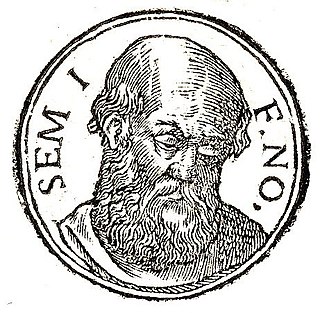 W
WShem was one of the sons of Noah in the Hebrew Bible as well as in Islamic literature.
 W
WAccording to the Book of Genesis, Simeon was the second son of Jacob and Leah, and the founder of the Israelite Tribe of Simeon. However, some Biblical scholars view this as postdiction, an eponymous metaphor providing an etiology of the connectedness of the tribe to others in the Israelite confederation. With Leah as a matriarch, Biblical scholars regard the tribe as having been believed by the text's authors to have been part of the original Israelite confederation, however, the tribe is absent from the parts of the Bible which textual scholars regard as the oldest, and some scholars think that Simeon was not originally regarded as a distinct tribe.
 W
WSons of God is a phrase used in the Hebrew Bible and in Christian Apocrypha. The phrase is also used in Kabbalah where bene elohim are part of different Jewish angelic hierarchies.
 W
WIn the Book of Genesis, Tamar was the daughter-in-law of Judah (twice), as well as the mother of two of his children: the twins Perez and Zerah.
 W
WTubal-cain or Tubalcain is a person mentioned in the Bible, in Genesis 4:22, known for being the first blacksmith. He is stated as the "forger of all instruments of bronze and iron". A descendant of Cain, he was the son of Lamech and Zillah. Tubal-cain was the brother of Naamah and half-brother of Jabal and Jubal. The Israeli kibbutz, Tuval is named after him.
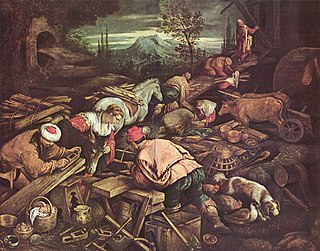 W
WThe wives aboard Noah's Ark were part of the family that survived the Deluge in the biblical Genesis flood narrative. They are the wife of Noah, and the wives of each of his three sons. Although the Bible only notes the existence of these women, there are extra-Biblical mentions regarding them and their names.